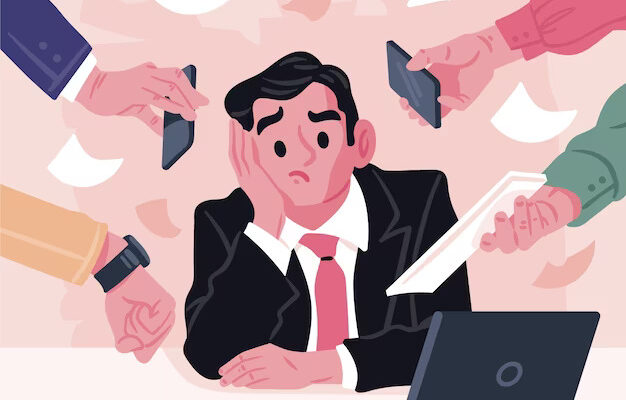
Feeling overwhelmed is a common experience when faced with stress, responsibilities, or challenges that seem too difficult to manage. It can manifest as a sense of being unable to cope or a feeling of being weighed down by tasks or emotions. During these times, it’s important to recognize and acknowledge these feelings without judgment. Taking small steps, prioritizing tasks, and seeking support from others can help alleviate overwhelm. Simple practices like deep breathing, taking short breaks, or engaging in activities that bring comfort can also provide relief.
Are You Feeling Overwhelmed?
Are you feeling overwhelmed? It’s a common experience when facing a lot of stress or tasks that seem too much to handle. You might feel like you’re drowning in responsibilities or emotions. It’s important to recognize these feelings and know that it’s okay to feel this way sometimes. Taking a moment to breathe deeply and prioritize tasks can help. Reach out to friends, family, or a trusted person for support. Recall that you are not required to handle every task at once. Break tasks down into smaller steps and take things one at a time.
What Causes Feeling Overwhelmed?
Feeling overwhelmed and need to overcome? Get support and encouragement from the “Online counsellor” with TalkToAngel.
- Overload of Information: The capacity of our minds is limited. A constant influx of tasks, demands, and information bombards our system, leading to overwhelm.
- Perfectionism’s Grip: Striving for unrealistic expectations creates a never-ending chase, fueling anxiety and ultimately, overwhelm.
- Ruminative Thinking: Dwelling on negativity and future-catastrophizing paints a bleak picture, adding to the feeling of being overwhelmed.
- Underlying Mental Health: Conditions like anxiety, depression, or ADHD can amplify everyday stressors and increase vulnerability to overwhelm.
- Life’s Crossroads: Major life transitions like job changes, relationships shifts, or personal losses can bring upheaval and uncertainty, triggering overwhelm.
- Financial Tightrope: Financial worries, debt, or job insecurity create a constant burden, contributing to feelings of being overwhelmed.
- Toxic Relationships: Dealing with unhealthy dynamics can be emotionally draining and exacerbate feelings of overwhelm.
- Work Overload: Unrealistic workloads, tight deadlines, or lack of support in the workplace can quickly become overwhelming.
- Social Media Maelstrom: The constant pressure, comparisons, and information overload from social media can be a significant source of overwhelm.
- It’s Common Ground: Feeling overwhelmed is a normal human experience. You’re not alone in this struggle.
- Pinpoint Your Triggers: Identifying what specifically throws you into overwhelm is key to taking control.
- Seek Support: Talk to trusted individuals or seek professional help to navigate and manage overwhelm effectively.
- Prioritize Self-Care: Practice mindfulness, get enough sleep, and engage in activities that bring you joy to build resilience.
- Delegate and Say No: Learning to delegate tasks and prioritize saying no empowers you to reduce unnecessary burdens.
These causes can vary in intensity and may overlap, contributing to a sense of being overwhelmed. Recognizing and understanding the underlying factors is the first step toward managing and addressing these feelings effectively.
How do I stop being Feeling Overwhelmed?
Stop feeling overwhelmed; seek professional help with TalkToAngel “Online psychiatric consultation” for healing and support.
- Prioritize tasks: Focus on what needs to be done immediately and what can wait.
- Divide up the work into smaller steps: –To make bigger jobs more feasible, break them up into smaller, more manageable pieces.
- Establish a to-do list:--List all of your assignments and rank them according to urgency and significance.
- Set realistic goals: Avoid setting unrealistic expectations for yourself and your abilities.
- Learn to say no: Don’t take on more than you can handle and be assertive in setting boundaries.
- Delegate tasks: Share responsibilities with others when possible and ask for help when needed.
- Take breaks: Allow yourself time to rest and recharge between tasks to avoid burnout.
- Take care of yourself:-– Take part in hobbies, meditation, or other relaxing and well-being-promoting activities.
- Manage time effectively: Use time management techniques such as the Pomodoro Technique or time blocking to stay organized and focused.
- Limit distractions: Minimize interruptions and distractions to maintain focus and productivity.
- Practice mindfulness: Stay present in the moment and focus on one task at a time to reduce overwhelm.
- Ask for assistance:-– Seek counsel and emotional support from friends, family, or a therapist.
- Set boundaries: Establish limits with others to protect your time, energy, and well-being.
- Celebrate progress: Acknowledge and celebrate small accomplishments along the way to keep yourself motivated.
- Adjust expectations: Be flexible and willing to adjust your goals and expectations as needed.
- Break tasks into smaller steps: Focus on completing one small task at a time rather than trying to tackle everything at once.
- Seek professional help: If feeling overwhelmed persists and impacts your daily functioning, consider seeking support from a therapist or counselor.
conclusion
Always keep in mind that asking for assistance is acceptable, and proceed cautiously. By implementing these strategies, you can regain a sense of control and manage feelings of overwhelm more effectively.











